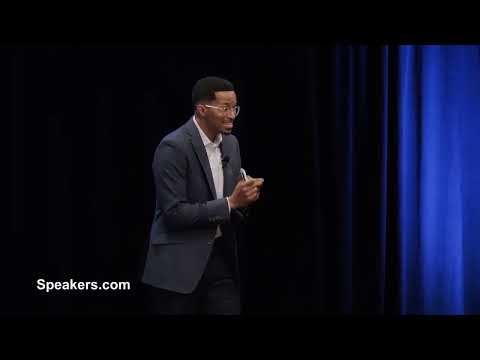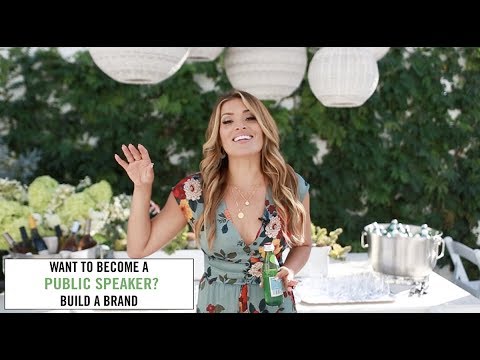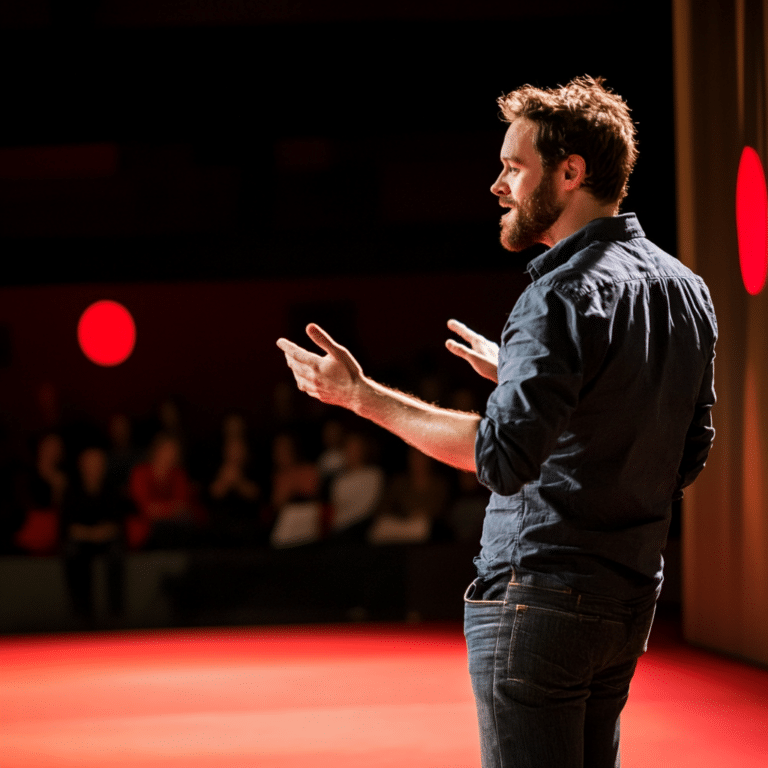Welcome to your ultimate guide on speaker brand development. If you want to become a commanding presence in the speaking world and land high-ticket engagements, you’ve come to the right place. Channeling the motivational energy of Tony Robbins and the strategic insight of Gary Vaynerchuk, I’ll share actionable advice to build a powerful personal brand, inspire audiences, and boost your career. Let’s dive in!
Why Speaker Brand Development is Crucial for Success
In today’s saturated market, being just another speaker isn’t enough. Your unique personality and recognizable identity can be the defining factor between success and mediocrity. Speaker brand development is about creating a distinctive image and message that resonates with your target audience, setting you apart from the crowd.
The Benefits of Speaker Brand Development:
- Increased Visibility: A strong brand makes you memorable, ensuring that event organizers and audiences think of you first.
- Higher Engagement: A consistent and relatable brand message connects emotionally, driving audience engagement and loyalty.
- Premium Speaking Fees: A well-developed brand positions you as an authority, enabling you to command higher fees for your engagements.
- Opportunities and Collaborations: Solid branding opens doors to joint ventures, partnerships, and more lucrative opportunities.
Top 5 Strategies to Elevate Your Speaker Brand Development
1. Establish a Strong Personal Brand Identity
Start by understanding what makes you, well, you. Look at speakers like Tony Robbins and Brené Brown for inspiration. Robbins is synonymous with high-energy personal development, while Brown is known for her down-to-earth approach on vulnerability and courage. Define your core message, values, and style—your brand identity should reflect your authentic self. Need more insights? Check out my personal branding Strategies.
2. Consistent Online Presence
A strong online presence is non-negotiable. Leverage social media, blogs, podcasts, and video content to consistently share your message. For instance, Simon Sinek, known for his powerful TED Talk “Start With Why”, maintains a consistent online presence through regular tweets, LinkedIn posts, and YouTube videos that align with his core message of leadership and purpose. For tips on how to maintain a consistent online brand, explore How To build a speaking brand.
3. Network and Collaborate with Other Influencers
Collaboration can skyrocket your brand by associating you with established industry figures. Mel Robbins’ collaboration on platforms like LinkedIn Learning and her podcast interviews have expanded her reach. These partnerships introduce your message to new audiences and lend credibility to your name.
4. Obtain and Showcase Testimonials and Endorsements
Nothing speaks louder than the endorsement of satisfied clients and respected peers. Collect testimonials from event organizers, attendees, and fellow speakers. Lisa Nichols, for example, prominently features testimonials from high-profile clients and attendees on her website, which bolsters her credibility and expertise.
5. Invest in Professional Development and Branding
Keep investing in yourself. Attend workshops, seek mentorship, and stay updated with trends. Professional branding also matters—a polished website, professional headshots, and consistent branding materials are crucial. Jay Shetty’s seamless online presence and top-notch content quality have cemented his brand in the personal development arena. For additional tips, explore our coaching For public Speakers.

| Aspect | Description | Example / Actionable Steps |
| Unique Value Proposition (UVP) | Identify what sets you apart from other speakers. This could be a specific area of expertise, a unique speaking style, or a particular life experience. | – Develop a clear statement – Conduct competitor analysis – Align with audience needs |
| Content Sharing | Consistently share content showcasing your expertise across various platforms such as social media, blogs, and websites. | – Post weekly blogs – Share speaking clips on social media – Write articles for industry publications |
| Audience Engagement | Engage with your audience by responding to comments, participating in discussions, and hosting live sessions. | – Conduct live Q&A sessions – Participate in relevant online forums – Respond thoughtfully to comments & messages |
| Networking | Build connections both online and in-person. This includes attending industry conferences, participating in speaking events, and joining professional groups. | – Attend industry events – Join speaking associations – Connect with other speakers on LinkedIn |
| Brand Voice | Maintain a consistent brand voice that reflects your unique personality and values across all communication channels, regardless of the team handling them. | – Develop a brand style guide – Train team on brand voice consistency – Regularly review communications for tone |
| Platform Consistency | Ensure your messaging is uniform across all platforms (social media, websites, emails, etc.) | – Regularly audit communications – Use scheduling tools to plan consistent posts – Cross-check messages for uniformity |
Speaker Brand Development Case Studies: Lessons from the Giants
Tony Robbins: Energy and Transformation
Tony Robbins has made energy and transformational events his hallmark. His UPW (Unleash the Power Within) events are legendary. Robbins’ brand merges high-intensity presentations with practical, life-changing advice, establishing a unique, unmistakable identity in personal development. His blend of motivational energy and strategic insight has helped countless individuals transform their lives and businesses.
Brené Brown: Authenticity and Vulnerability
Brené Brown’s brand revolves around authenticity and vulnerability. Her TEDx talk, “The Power of Vulnerability,” connects deeply with audiences by highlighting her own struggles and research findings. Her consistent messaging across books, TED talks, and online courses has cemented her authority on topics that resonate deeply with people.
Innovative Wrap-Up: The Future Trajectory of Speaker Brand Development
Building a successful speaker brand is an ongoing endeavor requiring authenticity, consistency, and strategic positioning. As we look ahead to 2024, the fusion of digital evolution and personalized branding will become even more crucial. Embrace digital tools, refine your message, and always be open to learning from the industry’s giants.
Key Takeaways:
- Authenticity Matters: Be true to yourself in your branding.
- Consistency is Key: Maintain a constant online and offline presence.
- Continuous Learning: Stay updated with trends and continuously develop your skills.
- Networking: Collaborate with other influencers to expand your reach.
- Professional Presentation: Invest in polished branding materials and a well-maintained online presence.
The future of speaker brand development isn’t just about being heard; it’s about creating a lasting impact that turns audiences into lifelong admirers. Craft your path with intention, shine your unique light, and let your brand define the next wave of transformative voices.
For more strategies and tips, don’t hesitate to visit my site and explore our rich resources on personal branding Strategies, How To build a speaking brand, and leadership development Tips. Your journey to the top starts now!

Ready to elevate your speaker brand? Need guidance tailored to your journey? Visit Connie Pheiff’s website for coaching, resources, and more. Launch your path to success today!
Speaker Brand Development: Your Path to Success
Fun Trivia and Interesting Facts
Building a strong speaker brand isn’t just about polish and poise; it’s also about embracing fun trivia and eye-catching facts that make your brand memorable. Did you know that Collin Rugg, a co-founder of Trending Politics, leveraged his knack for storytelling to skyrocket his brand in the political commentary arena? Similarly, when building your speaker brand, your unique storytelling ability can set you apart from the crowd.
In the pursuit of crafting an engaging brand, incorporating unique elements can boost your appeal. For instance, the popular YouTuber KSI didn’t just stick to content creation; he expanded his brand by launching the Prime KSI Flavor energy drink. So, don’t limit yourself to speaking engagements alone. Diversifying your brand through various channels can amplify your reach and impact.
A speaker’s brand often thrives on cultural ties and unique touches. Take Cazbar in Baltimore, a restaurant that mixes exceptional cuisine with cultural performances. Just like Cazbar enhances its dining experience with traditional belly dancing, adding unexpected elements to your presentations can leave lasting impressions on your audience. Think about combining your speaking engagements with interactive activities or unique formats to engage your listeners even more.
And if you thought interest rates were only relevant for finance enthusiasts, think again! Understanding trends like current mortgage rates can actually provide great analogies and examples in your talks, making complex topics more relatable. Who knew that seemingly unrelated trivia could add value to your speaker brand, right?
Finally, even characters from popular anime can inspire you. Take Hanma from Tokyo Revengers—a character known for his resilience and adaptability. Drawing inspiration from such characters can inject a dose of dynamism and versatility into your brand story, proving that influences come from the most unexpected places.
By weaving these engaging trivia and interesting facts into your branding strategy, you’ll create a speaker brand that’s not only authentic but also captivating.
What is brand voice development?
Brand voice development is all about crafting the unique personality your brand shows to the world. You need to maintain this personality consistently across all your communications, whether it’s on social media, your website, emails, or ads. The key is to make sure it doesn’t change no matter who’s handling different channels.
Which is the No 1 brand in speaker?
There’s no definitive No. 1 brand in speakers, as it depends on what you’re looking for. Some people swear by the overall sound experience of Bose, while others prefer the bass-heavy punch of JBL. It really boils down to personal preference and what kind of sound signature you enjoy.
How do you become a professional development speaker?
Becoming a professional development speaker involves a few steps. Start by honing your speaking skills and gaining expertise in your field. Networking and building a strong online presence are crucial. Practice, get feedback, and continuously improve. Start with smaller gigs and gradually work your way up as you build your reputation.
How do I sell myself as a public speaker?
To sell yourself as a public speaker, you need to showcase your unique value. Highlight your expertise and experience through engaging content across various platforms. Network online and in person to build relationships and visibility. Testimonials and a strong portfolio can also go a long way in establishing credibility.
What are the 3 C’s of brand voice?
The three C’s of brand voice are Clarity, Consistency, and Character. Clarity ensures your message is understandable, consistency keeps your voice uniform across all channels, and character gives your brand a distinct personality that resonates with your audience.
How to develop a unique brand voice?
Developing a unique brand voice involves understanding your audience and your brand’s core values. Think about the personality you want to project and how it aligns with what your audience expects. Keep it consistent across all platforms and communications to build familiarity and trust.
Is Bose or JBL better?
Choosing between Bose and JBL comes down to personal preference. Bose is known for an overall balanced sound experience, while JBL leans more toward a bass-centric sound. Both are excellent brands, but the best choice depends on the sound quality you’re looking for.
What company makes the best quality speakers?
Several companies are known for making top-quality speakers, and the best one for you depends on your needs. Bose, JBL, and Sony are often cited for their high-quality audio equipment. It’s a good idea to test a few out to see which brand suits your personal audio preferences.
What does JBL stand for?
JBL stands for James Bullough Lansing, the name of the company’s founding audio engineer. The brand is well-known for its innovative design and high-quality sound.
How do you become a highly paid speaker?
To become a highly paid speaker, you need to build a strong reputation and demonstrate your value. This involves gaining lots of experience, consistently delivering high-quality speeches, and networking effectively. Marketing yourself well and gathering testimonials from satisfied clients can also help elevate your status.
How much do professional development speakers make?
Professional development speakers can make anywhere from a few thousand dollars per engagement to tens of thousands, depending on their experience, reputation, and the size of the audience. Those at the top of their game can command high fees.
How to become a sought after speaker?
To become a sought-after speaker, focus on developing a unique perspective and strong content. Network extensively, both online and in person, to build your reputation. Deliver high-quality speeches consistently, gather testimonials, and use social proof to showcase your impact.
How do I price myself as a speaker?
Pricing yourself as a speaker involves understanding your value, experience, and the market rate. Research what other speakers in your niche charge, consider your level of expertise, and factor in your preparation time, travel, and expenses. Don’t undervalue yourself, but also be mindful of what your audience is willing to pay.
How to build your brand as a speaker?
To build your brand as a speaker, start by identifying your unique value proposition. You need to consistently share content that showcases your expertise and engages with your audience across various platforms. Networking, both online and in person, is crucial for developing your brand and increasing visibility.
Is Mark Zuckerberg a public speaker?
Mark Zuckerberg isn’t primarily known as a public speaker. While he does speak at events and conferences, his reputation is mainly built on his role as the co-founder and CEO of Facebook. He’s more known for his contributions to tech and social media rather than public speaking prowess.
What is an example of brand voice?
An example of brand voice might be Wendy’s on Twitter. They’re known for their witty and sometimes snarky tone, engaging with followers in a playful and distinctive way that aligns with their brand’s personality.
What is a brand voice for a nonprofit?
A brand voice for a nonprofit should reflect its mission and values. It should be empathetic, authentic, and inspiring, aiming to connect emotionally with supporters and beneficiaries. Consistency across all communications helps build trust and community around the cause.
What is Nike’s brand voice?
Nike’s brand voice is inspirational and motivational, often focusing on the empowerment of athletes and individuals striving to reach their potential. Their tone is confident, encouraging, and sometimes provocative, urging people to “Just Do It.”
What is the difference between brand voice and product voice?
Brand voice is about the consistent personality and tone a company uses in its communications, while product voice is more specific to how individual products are talked about. Brand voice is broader and applied across all messaging, while product voice can adapt to fit the specifics of each product’s marketing needs.









